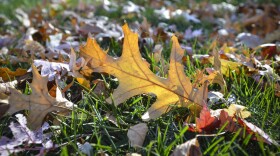-
The Strips Chicken and Brewing location in Lenexa boasts a garden where the restaurant's founder grows heirloom tomatoes, lettuce, red onions, spinach, kale and more. He uses much of the produce in his menu.
-
Scientists say leaving autumn leaves on the ground can add important nutrients to the soil and create needed habitat for insects.
-
A gun that finds its way into the wrong hands can have deadly consequences. That’s why some people surrender their unwanted guns to Central Presbyterian Church to be repurposed into gardening tools and other art.
-
Missouri and Kansas are home to approximately 400 different bee species. Some residents are turning their yards and balconies into havens of native plants.
-
In a new partnership with a company that provides high-tech garbage cans that turn food into compost, Kansas City will compost hundreds of thousands of tons of food waste for use on gardens and to grow food. Kansas Citians can now bring their food scraps to one of 50 bins around the city.
-
The 100-acre tree nursery at George O. White State Forest, in Licking, Missouri, serves 13,000 customers a year — in the Show-Me State and beyond. Pawpaws are one of their most popular orders.
-
The Giving Grove, a nonprofit that works with residents of under-resourced communities to grow orchards, will translate their educational gardening materials into 12 different languages. Non-English speaking communities face barriers to accessing the free fruit and nuts because information has been printed only in English.
-
Earlier this December, the Kansas City Rose Society launched its Save the Pillars Campaign, which aims to raise $20,000 by the end of the year to help restore the historic stone structures in the Laura Conyers Smith Municipal Rose Garden in Loose Park.
-
There’s no shortage of products designed to grow beneficial fungi that will help your crops or garden. Whether they actually do that, though, is a different matter.
-
The first English word for “lawn” dates back to the early 1500s, described as an “open space among trees.” Lawns today are a far cry from that description, but they’ve come to dominate our physical — and cultural — landscapes. Now concerns over environmental impacts are propelling yet another redefinition.
-
Native plant species are better adapted for our environment, great food for bees and butterflies, and available to purchase at nurseries and plant shops across the Kansas City region. Can you dig?
-
The practice of preserving food via canning has been around for two centuries, but has experienced a revival in interest. Here’s how two Kansas Citians are keeping the practice alive in two very different ways.
Play Live Radio
Next Up:
0:00
0:00
Available On Air Stations












